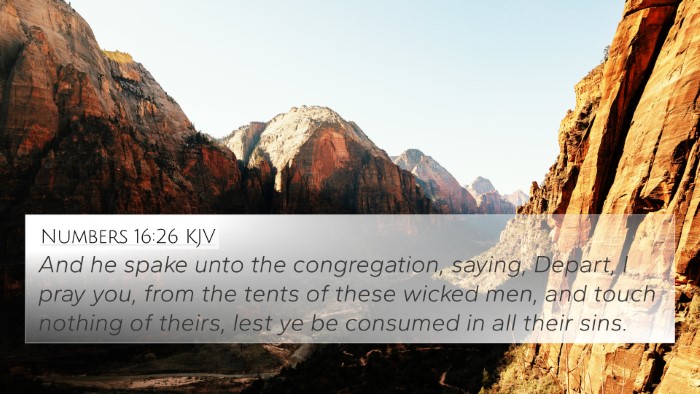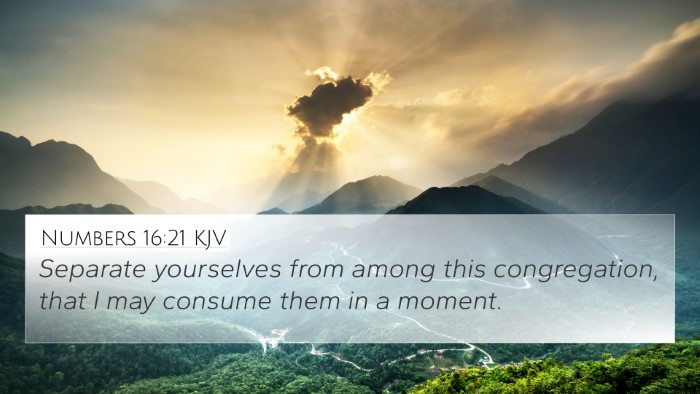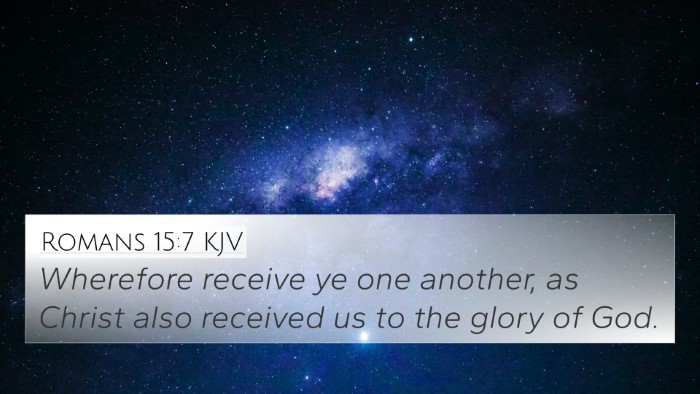Understanding 2 Corinthians 6:17
Bible Verse: 2 Corinthians 6:17
“Therefore, come out from them and be separate, says the Lord, and touch no unclean thing; then I will welcome you.”
Summary of Meaning
This verse emphasizes the call for believers to separate themselves from anything that contradicts the holiness and purity of God. It reflects the theme of separation from worldly influences and establishing a distinct identity as God's people.
Commentary Insights
-
Matthew Henry:
Henry discusses the importance of spiritual separation and how it is necessary for the true worship of God. He highlights that this separation has both physical and spiritual implications, urging Christians to avoid associations with practices and people that can lead them away from holiness.
-
Albert Barnes:
Barnes interprets this verse as a call to purity and holiness, explaining that God desires His followers to maintain a distinct lifestyle that reflects their commitment to Him. He stresses that such separation is essential for being received and blessed by God.
-
Adam Clarke:
Clarke elaborates on the consequences of such separation and how it establishes a covenantal relationship between God and His people. His analysis emphasizes that being set apart is a divine requirement, highlighting that a true relationship with God involves a departure from sinfulness.
Inter-Biblical Dialogue
This verse connects with various themes throughout the Bible, encouraging a deeper understanding through scripture cross-referencing. Below are notable related verses:
-
Isaiah 52:11: "Depart, depart, go out from there; touch no unclean thing; go out from the midst of her; be clean, you who bear the vessels of the Lord."
-
Revelation 18:4: "Then I heard another voice from heaven saying, 'Come out of her, my people, lest you share in her sins, and lest you receive of her plagues.'"
-
1 Peter 2:9: "But you are a chosen race, a royal priesthood, a holy nation, a people for his own possession, that you may proclaim the excellencies of him who called you out of darkness into his marvelous light."
-
Ephesians 5:11: "Take no part in the unfruitful works of darkness, but instead expose them."
-
Jeremiah 51:6: "Flee from the midst of Babylon, and save your lives! Do not be cut off in her punishment, for this is the time of the Lord’s vengeance, the repayment he is rendering her."
-
Hebrews 13:13: "Therefore let us go to him outside the camp and bear the reproach he endured."
-
2 Timothy 2:19: "But God's firm foundation stands, bearing this seal: 'The Lord knows those who are his,' and, 'Let everyone who names the name of the Lord depart from iniquity.'"
-
Matthew 5:13-16: "You are the salt of the earth, but if the salt has lost its taste, how shall its saltness be restored? It is no longer good for anything except to be thrown out and trampled under people's feet."
Thematic Bible Verse Connections
2 Corinthians 6:17 serves as an anchor point for exploring various themes in Christian doctrine related to holiness, separation from sin, and the believer's identity. The combinations of these verses enhance the understanding of the Christian calling to live distinctly.
Tools for Bible Cross-Referencing
For those interested in deepening their understanding of the Bible’s interconnectedness, utilizing tools such as a Bible concordance or a cross-reference Bible study guide can be beneficial. These tools aid in cross-referencing Biblical texts and assist in exploring thematic Bible verse connections.
How to Use Bible Cross-References
Cross-referencing scripture can uncover profound insights into God’s Word, illustrating the connections between Bible verses and enhancing our understanding. A comprehensive Bible cross-reference system can facilitate this exploration, revealing Bible verses that relate to each other.
Conclusion
2 Corinthians 6:17 calls believers to embrace their identity as the people of God by separating themselves from sin and worldly influences. Through comparative Bible verse analysis and scriptural cross-referencing, one can appreciate this call to holiness and the overarching narrative of God's desire for a distinct people.
















